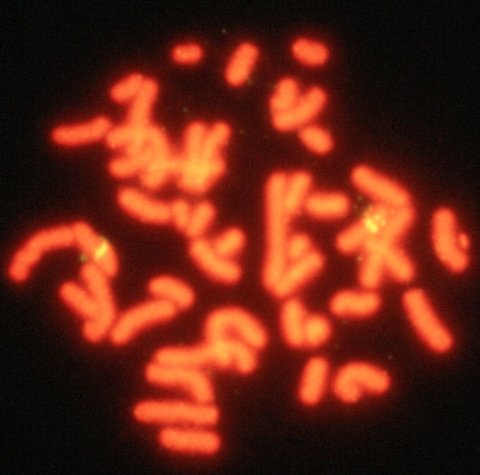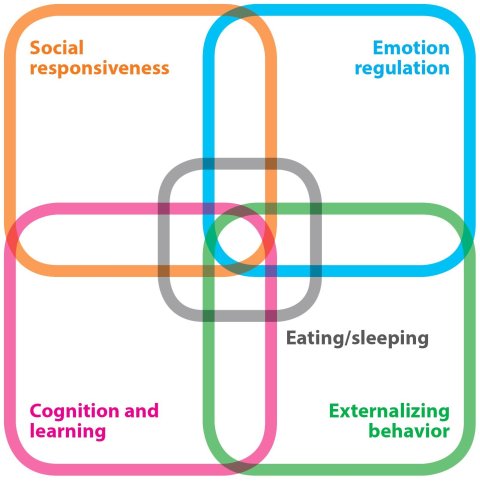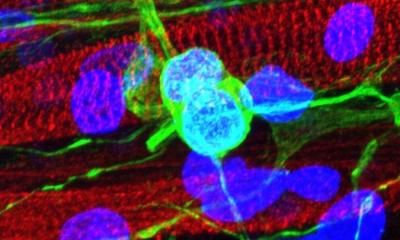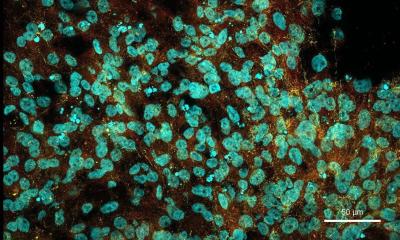News • Duchenne muscular dystrophy
DMD: New tool helps manage neurobehavioral difficulties
A pilot study using a new screening tool shows promise for assessing neurobehavioral difficulties in children with Duchenne muscular dystrophy (DMD) and improving quality of life for patients and their families.

Image credit: Wessex Reg. Genetics Centre. Source: Wellcome Collection (CC BY 4.0)
Results appear in the Journal of Neuromuscular Diseases, published by IOS Press (now part of Sage).
Lead investigator Liesbeth De Waele, MD, PhD, Department of Pediatrics, University Hospitals Leuven, and Department of Development and Regeneration, KU Leuven, Leuven, Belgium, explains: “Many patients with DMD also suffer from neurobehavioral difficulties that can significantly impact their quality of life and that of their families. The pathophysiological mechanisms behind these neurobehavioral difficulties are still poorly understood, and in clinical practice these aspects of the disease receive less attention than the physical symptoms. Despite growing awareness, many patients still lack easy access to behavioral specialists such as psychologists.”
The research team first investigated how these neurobehavioral difficulties are managed in various centers worldwide. Twenty-eight respondents from 16 countries completed an online survey. Only 35% of the centers systematically screened for neurobehavioral difficulties in their DMD population. Predominant screening methods included history taking and clinical observation. Common neurobehavioral difficulties encompassed learning challenges, dependency from adults, anxiety, concentration difficulties, and social deficits. The participating centers frequently employed parental counseling and liaison with psychosocial healthcare professionals for psychosocial intervention.

Image credit: Sam Geuens
Professor De Waele and neuropsychologist and first author Sam Geuens, PhD, Department of Pediatrics, University Hospitals Leuven, and Department of Development and Regeneration, KU Leuven, Leuven, Belgium, comment: “Although physicians often screen for these problems, we found they mostly rely on their own expertise or experience due to the absence of a specific guiding instrument. Our study underlines the complex and diverse nature of neurobehavioral difficulties in DMD and the challenge of addressing these in clinical practice. Our findings emphasize the urgent need for international collaboration in developing unified protocols that enhance the quality of care for individuals and their families struggling with the complex behavioral dimensions of DMD.”
To address this gap, the researchers developed a screening tool for neurobehavioral difficulties in DMD and report on a pilot study of 20 patients in the same issue. Known as the Duchenne Muscular Dystrophy-Associated Neurobehavioral Difficulties (DuMAND) Checklist, this tool aims to comprehensively cover the spectrum of neurobehavioral issues in DMD patients, including behavior, psychiatric disorders, and various cognitive, academic, and psychosocial deficits.
The DuMAND categories were derived through literature review and feedback from 85 parents (48 mothers and 37 fathers) and 28 experts in the field. Dr. Geuens explains: “During the development of this tool, we identified behaviors frequently reported by the literature, parents, and DMD experts as particularly challenging in DMD patients. The DuMAND concept is based on this feedback and encompasses the spectrum of neurobehavioral difficulties seen in DMD.”
The DuMAND concept can serve as a common language in the DMD field, and implementing the DuMAND Checklist can be the first step towards harmonizing clinical care for neurobehavioral difficulties in DMD worldwide
Liesbeth De Waele
The investigators carried out a pilot validation study of the first version of the DuMAND Checklist in a sample of 20 parents of patients with DMD at the University Hospitals Leuven, Belgium. Children were included if they had a confirmed genetic diagnosis of DMD and were 6-18 years old. The checklist consisted of 43 items and took about seven minutes to complete. It showed acceptable-to-excellent psychometric properties in this pilot validation study.
Professor De Waele concludes: “The DuMAND concept can serve as a common language in the DMD field, and implementing the DuMAND Checklist can be the first step towards harmonizing clinical care for neurobehavioral difficulties in DMD worldwide. Ultimately, the DuMAND Checklist aims to screen for neurobehavioral issues, enabling early interventions. Additionally, it can be used to evaluate these interventions in the short and long term and serve as a behavioral outcome parameter in clinical studies in DMD, which is currently lacking in most studies. The next step is to validate the DuMAND Checklist in a larger, international cohort. We seek international collaboration to further optimize the DuMAND concept and Checklist and to reach a consensus on clinical implementation.”
Source: IOS Press
16.08.2024











